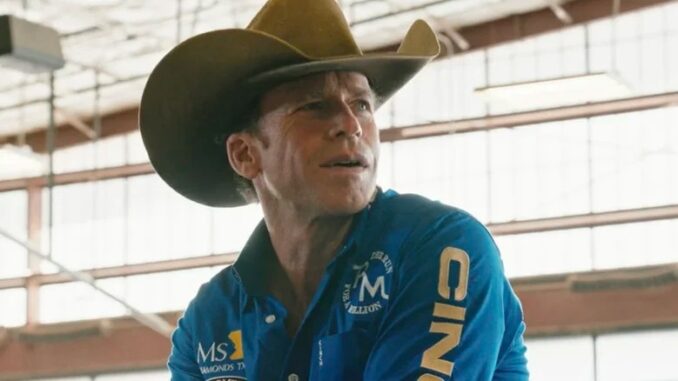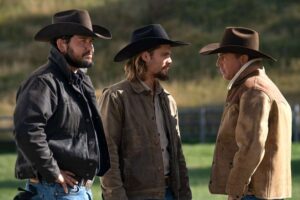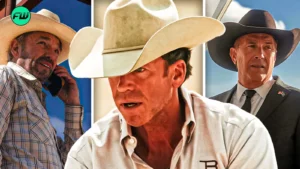
Taylor Sheridan, the creator of the hit television series Yellowstone, has built a reputation for crafting compelling narratives set against the backdrop of the rugged American West. The show, starring Kevin Costner as the patriarch of the Dutton family, has garnered widespread popularity and a dedicated fanbase. However, it has also faced its fair share of criticism from certain reviewers. Despite this, Sheridan remains steadfast in his creative vision and unshaken by negative reviews.
When addressing the critiques of Yellowstone, Sheridan’s perspective highlights his deep commitment to storytelling. He’s known for creating characters that are morally complex, set in environments that are as unforgiving as they are beautiful. For Sheridan, the heart of Yellowstone lies in its exploration of power, loyalty, and survival. This approach has led some critics to label the series as overly dramatic or lacking subtlety, but Sheridan views these criticisms as a byproduct of the risks he takes as a creator.

In interviews, Sheridan has expressed that he doesn’t craft his stories to please everyone. “If you try to make something for everyone, you end up making it for no one,” he’s said in the past. Instead, his focus remains on creating narratives that resonate deeply with those who connect to them. For Sheridan, this means staying true to the themes and tone that define his work, even if it invites polarizing opinions.
One key aspect of Yellowstone that has sparked debate is its portrayal of the American West and the conflicts surrounding land ownership. The show delves into the struggles of the Dutton family as they fight to protect their ranch from encroaching developers, Native American tribes, and government entities. While some critics argue that the series romanticizes a specific perspective of the West, others praise it for tackling complex issues such as colonialism, gentrification, and environmental preservation. Sheridan has noted that his goal is not to provide easy answers but to present the realities of these conflicts in a raw and authentic way.
Sheridan’s writing often reflects his own experiences growing up in rural Texas, where he witnessed firsthand the challenges faced by ranchers and small-town communities. This personal connection to the material adds an extra layer of authenticity to his storytelling. He’s remarked that many of the themes in Yellowstone stem from his observations of how modernization and urbanization impact traditional ways of life. For Sheridan, the criticism that his work is overly dramatic or idealistic misses the point—he’s not trying to create a documentary but rather a dramatic exploration of human nature and societal change.
Another recurring criticism of Yellowstone is its pacing and character development. Some reviewers have argued that the show’s plotlines can feel exaggerated or unrealistic. However, fans often counter this by pointing to the show’s ability to immerse viewers in a world that feels both larger-than-life and deeply personal. Sheridan’s characters are often caught in moral dilemmas, forced to make tough decisions that test their values and relationships. This tension, according to Sheridan, is what drives the narrative and keeps audiences invested.
Sheridan’s approach to filmmaking and television production is also worth noting when considering his response to negative reviews. Unlike many showrunners, Sheridan is deeply involved in nearly every aspect of his projects, from writing and directing to casting and location scouting. This hands-on involvement ensures that his vision is realized on screen, but it also means that he’s more exposed to criticism. Yet, Sheridan’s confidence in his creative choices allows him to weather these critiques without compromising his vision.

The success of Yellowstone speaks volumes about the effectiveness of Sheridan’s approach. Despite the mixed critical reception, the show has become a cultural phenomenon, drawing millions of viewers and spawning several spinoffs, including 1883 and 1923. These prequels have further expanded the Yellowstone universe, exploring the historical roots of the Dutton family and the evolution of the American West. Sheridan’s ability to build a cohesive and compelling narrative across multiple timelines is a testament to his skill as a storyteller.
For Sheridan, the ultimate measure of success isn’t the reviews but the connection his work fosters with audiences. He’s often spoken about the importance of authenticity in his storytelling, striving to create characters and scenarios that feel real, even within the heightened drama of a television series. This authenticity, combined with his willingness to tackle controversial themes, is what has endeared Yellowstone to its fans and cemented its place in the cultural zeitgeist.
In the end, Sheridan’s response to negative reviews underscores his commitment to his craft. Rather than letting criticism dictate his creative choices, he uses it as an opportunity to double down on his vision. Sheridan’s resilience in the face of criticism serves as a reminder that great storytelling often involves taking risks and challenging conventions. For viewers who have come to love Yellowstone and its characters, this unwavering dedication is precisely what makes the show so compelling.
